These days, automation is everywhere you look, from manufacturing to customer service. But nowhere is it more prevalent than in the world of marketing.
Marketing automation tools are used for crafting, scheduling, and publishing everything from social media ads to email campaigns.
So, it’s no surprise that there are plenty of tools to help you automate various marketing processes, and that plenty of marketers have embraced using them.
In fact, Salesforce research shows that an average of 78% of companies are currently using marketing automation.
But just because one of your colleagues used CRM marketing automation tools at their previous job doesn’t mean your team needs to use the same tools. Just because your competitor is using HubSpot doesn’t mean that’s the most suitable solution for your business.
Choosing the right digital marketing automation tools for your needs requires careful consideration. You need to understand your use cases and needs. You also need to consider whether your team is even ready for automation.
To help you decide, we’ve compiled a comprehensive list of automation tools for marketing, including all-in-one solutions and marketing automation tools for enhancing email campaigns.
What are marketing automation tools?
What is a marketing automation tool exactly? Marketing automation platforms automate repetitive marketing tasks involved in different processes, from lead generation to email marketing.
If you're wondering what kinds of tasks these platforms can handle, here are a few examples of marketing automation tools in action:
Email cycles, such as welcome and nurturing emails
Message personalization
Social media posting
SEO keyword research
CRM updates
Lead qualification and scoring
SMS marketing cycles
Contact management
These marketing automation tools examples illustrate how businesses can streamline their efforts and free up time for more strategic work.
Benefits of marketing automation tools
But, what is a marketing automation tool actually good for? Marketing automation tools are like having a highly efficient personal assistant. They make your life easier by handling repetitive tasks, keeping things organized, and freeing you up for higher-value work.
Below are some principal advantages of automation marketing tools:
Improved efficiency
Marketing automation tools take repetitive tasks like email marketing, lead generation, and social media scheduling off your plate. As a result, you can focus on strategic and creative tasks. This, in turn, saves time and resources, as well as enhancing productivity.
Simplified lead management
With automation marketing tools, tasks like lead scoring and nurturing are streamlined. As such, prospects move through the sales funnel more efficiently.
These tools send targeted content based on user behavior and stage, enhancing conversion rates and speeding up the sales pipeline.
Enhanced personalization
Customers today want brands to understand and anticipate their needs. According to a recent study, 84% of them prefer companies that offer a personalized experience. Therefore, if you can’t meet this demand, they’ll find a business that can.
That’s where marketing automation tools come into play. These tools enable you to gather insights from customer interactions and deliver personalized content that resonates with them.
This connection strengthens the brand-customer relationship, increasing satisfaction.
Reduced operational costs
Regardless of your business size, automation tools for marketing can improve cost savings. Many platforms have free plans or tiered pricing that suit different budgets and business needs.
This means that you can start with affordable options and scale up as your business grows.
Data-driven decision-making
The top marketing automation tools have built-in reporting capabilities and advanced tracking.
With insights into campaign performance across multiple channels, you can refine your marketing automation strategy.
This data-driven approach aids businesses in making informed decisions and improving their marketing efforts.
Plus, with robust marketing automation integrations, these tools can connect seamlessly with CRMs, ad platforms, and analytics suites—making it easier to centralize data and create more effective, unified campaigns.
When should you be integrating marketing automation tools?
Most businesses today buy a marketing automation tool without stopping to consider whether they really need it yet. As the outstanding buzzword of late, automation can feel like an obvious step toward scaling your marketing operation, but you need to have a true marketing operation first.
Adding digital marketing automation platforms before you're ready is worse than not having them in the first place.
If you're unsure where to start, conducting a marketing automation tools comparison can help you evaluate features based on your current needs and readiness.
Before investing in automation, you should:
Have a marketing team of at least one person. Using digital tools to automate marketing tasks can help you reach more people. However, it won't replace knowing how to market well. If you're starting a business or are part of the initial team handling various tasks, just adding an automation tool won’t solve everything.
Have found at least one marketing channel that works for you. Marketing automation tools help scale your marketing efforts, but you don’t want to scale something that doesn’t actually work yet.
Ensure that all of your marketing efforts flow from a defined strategy. For the same reason as above, you don’t need an automation tool to throw more spaghetti at the wall in the hope that something sticks.
Ensure that your marketing team has more money than time. A plan for automating marketing tasks lets your team do a lot more in less time. But to gain that time, you need to be OK with spending money on these tools.
Have started following a growth marketing strategy. Growth marketing tactics are important to plan for each stage of the funnel. You don't want to subscribe to a new tool without a plan for how that tool will move your business forward.
Remember, even if you do tick these boxes, you don’t have to go all in from the start. Many businesses over-invest in an all-in-one solution when they need only email automation, for example. Take time to consider where your needs really lie—then find your use case for an automated marketing platform.
Lastly, if you want to learn more about who Leadfeeder is and what we do, you can skip straight to the customer journey automation section where we explain how we fit into the marketing automation landscape.
Which types of marketing automation tools are the best?
The best marketing automation tools depend entirely on your organization’s specific needs, goals, and existing tech stack. Rather than focusing on individual products, it’s more valuable to understand which categories of tools excel for particular use cases.
As such, we’ve divided our marketing automation tools list into the following categories:
All-in-one automated marketing tool
Email automation marketing tool
Social media automation tools
Customer journey automation tools
Pricing automation tools
Advertising automation tools list
Loyalty and referral marketing automation tools.
Best all-in-one automated marketing tools
Organizations looking for an all-in-one marketing automation platform have usually already found several effective marketing channels, regardless of which ones they are. That means:
You’ve seen success across more than one or two channels.
You’re already financially investing in scaling your marketing operation.
Your team needs to scale the channels that are working or experiment with additional avenues.
If that sounds like your team,
you’ll benefit most from platforms that support the best marketing automations—such as lead nurturing, behavioral triggers, and multichannel campaigns—designed to streamline and scale your marketing efforts efficiently.
1) ActiveCampaign
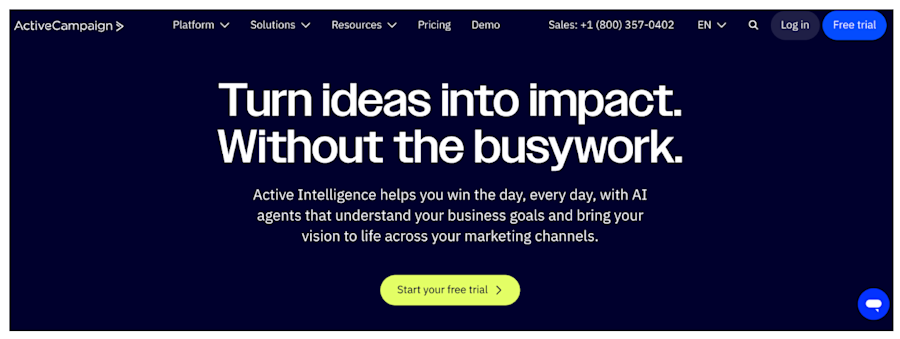
As a marketing automation tool, ActiveCampaign does the best job of working automation into real human processes. The reality is that marketing automation platforms can’t handle everything—there are certain aspects of marketing that need a human touch.
ActiveCampaign built its software around that idea, adding features like notification emails that empower marketers and salespeople instead of replacing them.
ActiveCampaign costs anywhere from $15 to $145 per month, based on the features and number of contacts.
2) Sender
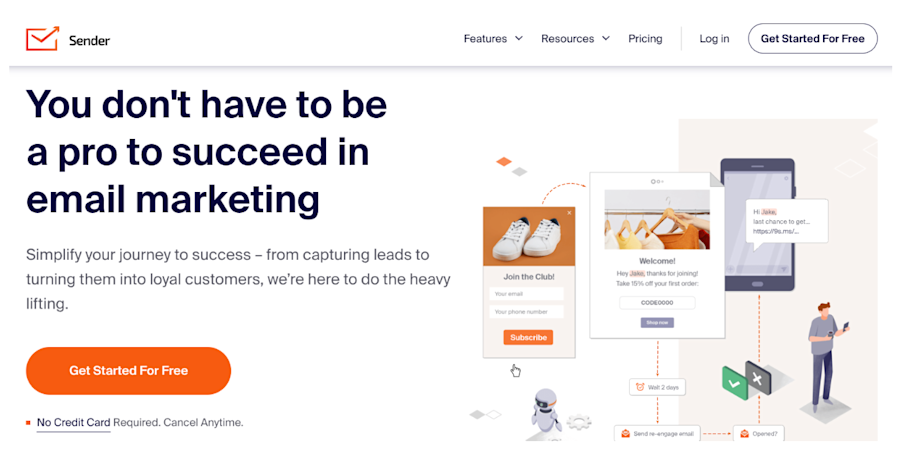
Sender is a powerful yet affordable email and SMS marketing automation platform that lets you grow your business without breaking the bank.
The platform is designed to help e-commerce store owners, small-business owners, bloggers, and B2B startups automate their email and SMS marketing campaigns.
Sender offers intelligent automation, segmented lists, and a form/pop-up builder, among other features. It's an excellent tool for businesses aiming to expand their subscriber lists, boost audience engagement, and increase their revenue quickly.
Sender's monthly pricing starts at $7, varying based on subscriber count, emails sent, and extra features. It also offers a free plan for up to 2,500 subscribers and 15,000 emails per month, which remains free forever. For enterprise pricing, custom plans are available.
3) Omnisend
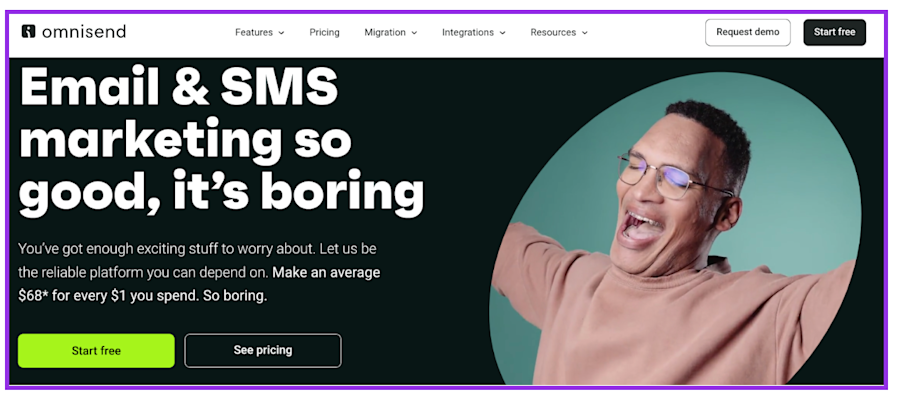
It’s hard to find a more comprehensive tool than Omnisend. The omnichannel functionality sets this marketing automation platform apart from the others on this list.
It allows you to add several channels to the same automation workflow: email, SMS, push notifications, Facebook Messenger, and more.
This means you can create an immersive omnichannel experience for your customers so you can automatically send them messages via the channel they’ve opted for. With advanced targeting, split automation, and an easy drag-and-drop builder, Omnisend is worth a look.
Omnisend offers a free plan for essential email marketing. The automation packages begin at $16 per month and can be customized for enterprise-level pricing, contingent on the automation features required and the number of contacts.
4) Marketo Engage
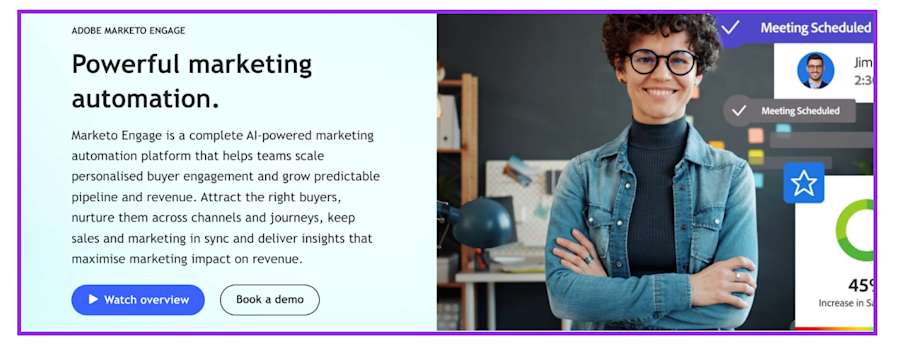
Marketo Engage claims to offer marketing automation that covers any channel and every type of engagement. Since Adobe’s acquisition, the list of tasks that work together on Marketo Engage has only multiplied.
The full-featured software can handle everything from digital advertising to social media to account-based marketing—making it a perfect option for larger marketing operations.
Contact Adobe for customized pricing.
5) Oracle Eloqua
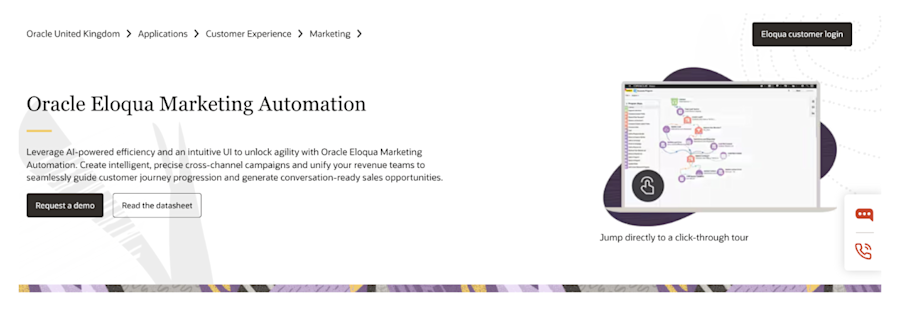
Oracle Eloqua stands out by seamlessly collaborating with various marketing tools.
With more than 500 pre-built integrations, Oracle Eloqua personalizes and streamlines every facet of your marketing journey. It's among the select all-in-one solutions that are explicitly designed to cater to B2B marketers and enterprises.
Oracle Eloqua’s pricing starts at $2,000 per month for the Basic plan. The Standard plan costs $4,000 per month. For Enterprise pricing, contact Oracle.
6) HubSpot
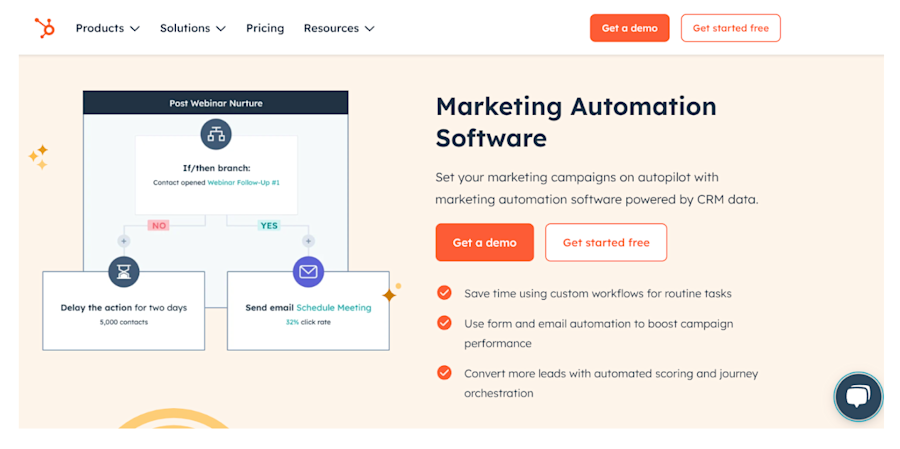
HubSpot's Marketing Hub fundamentally differs from other marketing automation tools for a few reasons. Its focus on inbound marketing (including content and search marketing) is unparalleled. It also offers the added benefit of CRM, Sales, and Service Hubs, which means your team can work better together—even across departments.
For individuals and small teams, HubSpot offers free tools that allow two users to start generating and emailing new leads. Paid plans start at $15 per seat, per month when paid annually. The Enterprise plan costs $3,600 per month (billed monthly) for five seats.
7) Marketing Cloud Account Engagement
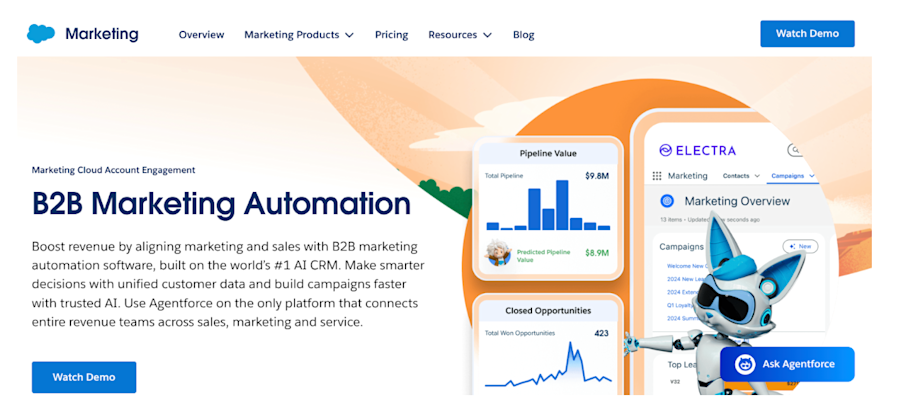
Marketing Cloud Account Engagement is a B2B-focused marketing tool. It supports B2B analytics and account-based marketing solutions. Marketing Cloud Account Engagement is part of a suite of products for enhanced teamwork between sales and marketing.
Marketing Cloud Account Engagement has four pricing tiers, starting at $1,250 per month for the Growth plan. The most expensive plan is the Premium plan, which costs $15,000 per month.
Best email marketing automation tools
Although the comprehensive tools mentioned so far are well-known, email automation is the first thing most people think of when they hear "marketing automation platform."
Email marketing automation tools are significantly more cost-effective than all-in-one solutions. , So, investing in more than what your team requires or will actively utilize is impractical.
Email automation also has a wide range of use cases. Your team could likely benefit from it if:
You’ve seen a bit of baseline success with email marketing.
You need to send transactional emails in addition to marketing material.
Someone on your team has been manually sending the emails for every campaign.
Email marketing automation tools handle tasks like sending triggered emails, and they enable marketers to build complex automated marketing campaigns and personalized audience segments.
8) Mailchimp
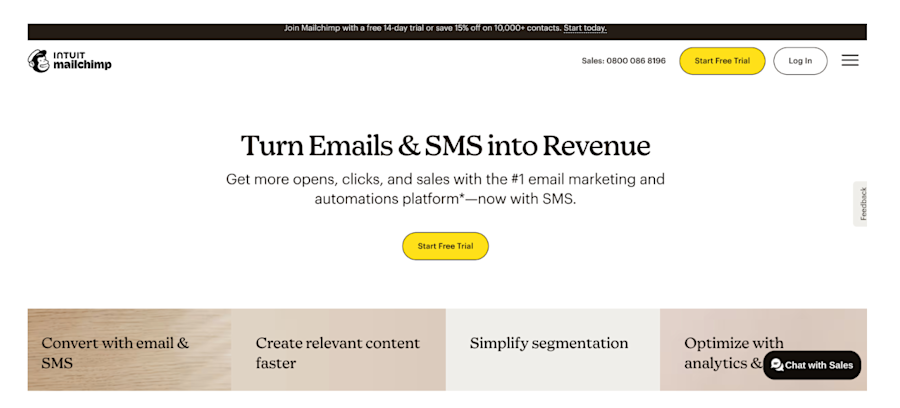
Intuit Mailchimp is one of the original email marketing tools. Now, it has transformed into a marketing automation and email platform that’s designed to help businesses grow their audience and build strong customer relationships.
It offers tools to help with a variety of tasks, including creating and sending targeted email campaigns, building websites and landing pages, and automating marketing workflows.
It can be integrated with many popular apps and e-commerce platforms, making it an all-in-one solution for small to medium businesses aiming to enhance their marketing efforts.
Intuit Mailchimp’s paid plans start at $13 per month for the Essentials plan, with the first 14 days free. The Standard plan also offers the first 14 days for free and then costs $20 per month. The Premium plan costs $297.50 per month for the first 12 months. After that, it’s $350 per month.
9) Automizy
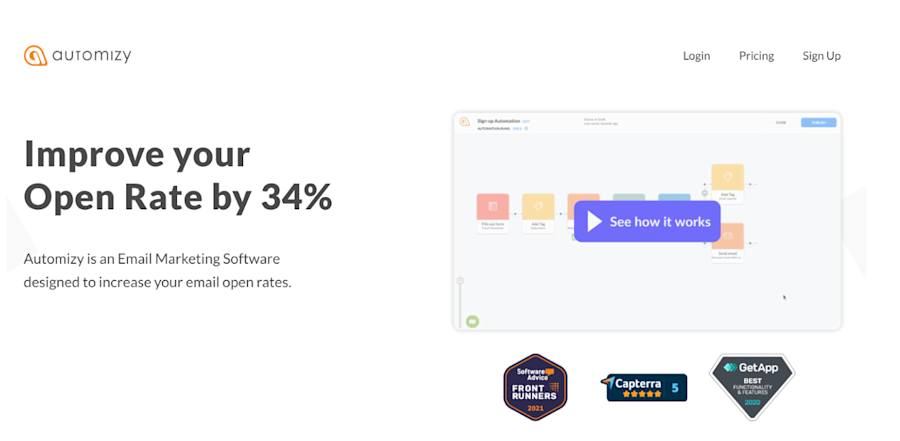
Automizy is a marketing automation platform that’s designed to streamline and enhance email marketing campaigns. It offers various tools and features to help businesses initiate, manage, and optimize their email marketing efforts.
Automizy provides functionalities like AI subject line testing, email templates, automated workflows, A/B testing, segmentation, and analytics. It also maintains message consistency and personalization for your audience.
The pricing for Automizy starts at $9 per month and can go up to $119 or more, depending on the number of active subscribers.
10) Constant Contact
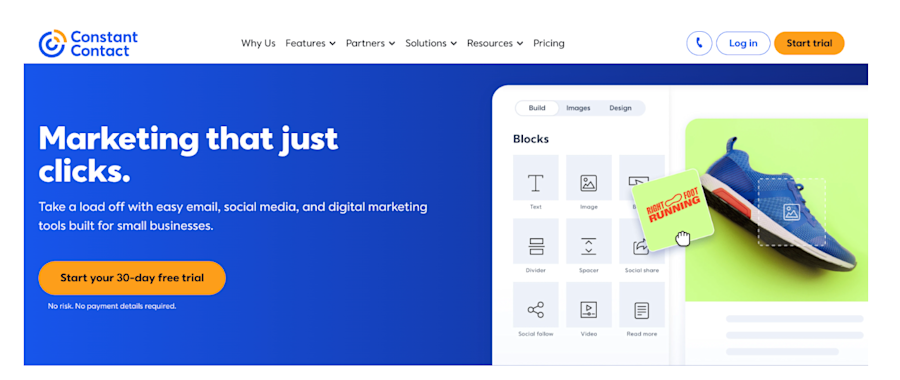
Constant Contact is a widely recognized email marketing automation platform that empowers businesses to effectively create, send, and track email campaigns. It offers a user-friendly interface with a range of tools.
You can create automated trigger campaigns, automatically collect new emails, and send segmented follow-up messages. With Constant Contact, your email program has all of the features you need without the clutter that certain tools drown you in.
Constant Contact offers a tiered pricing structure, varying between $12 and $80 per month, based on the selected features and the size of your contact list.
11) Customer.io
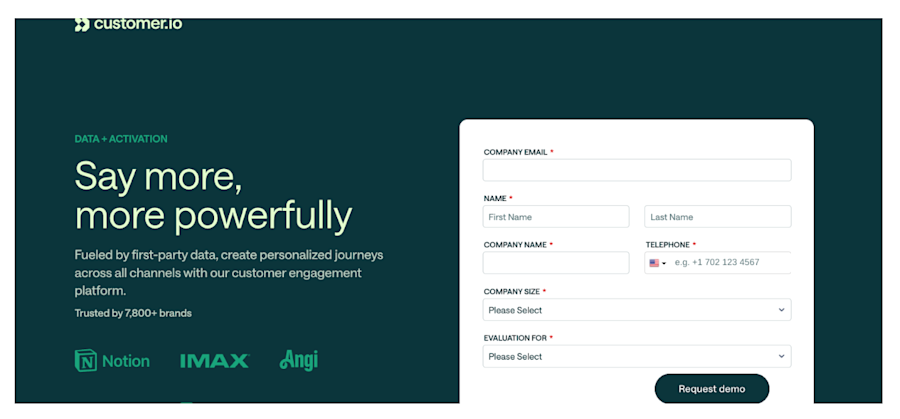
Customer.io is a versatile platform that’s primarily focused on behavior-based email and messaging automation. It allows businesses to create targeted and personalized communication campaigns based on user behavior, interactions, and specific triggers.
With Customer.io, you can send tailored messages through various channels, such as email, push notifications, and SMS.
Tons of integrations make it easy to funnel data from across your technology stack and turn it into automated segments and email campaigns that resonate with your audience.
Customer.io's pricing structure spans from $100 to upward of $1,000 per month, depending on the chosen features and level of support provided. For Enterprise pricing, get in touch with Customer.io.
12) Drip
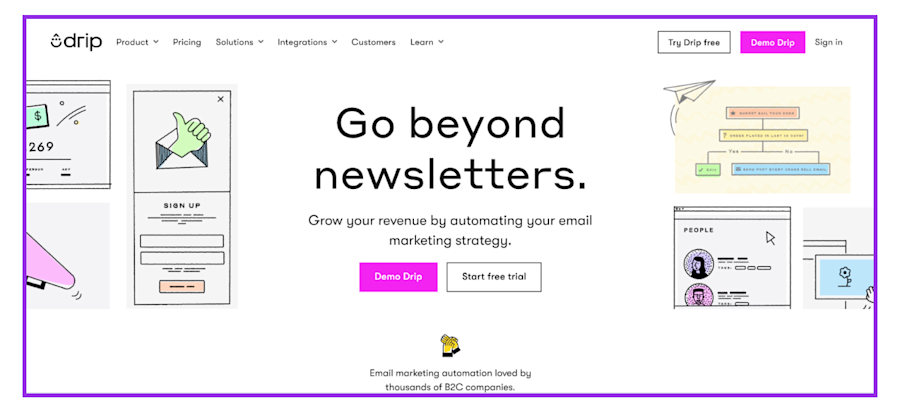
Drip’s email marketing automation is built for e-commerce businesses—meaning it works with all of the other e-commerce tools you use.
You can create relevant, personalized content and automate your campaigns based on customer behavior. Drip also offers more than email automation so your messages stay consistent and work together to drive customers toward a purchase.
Drip offers a pricing model that starts at $39per month for smaller email lists and goes up to $1,999 per month for email lists that contain 180,000 people. For larger email lists, contact Drip for custom pricing.
Additionally, Drip provides a 14-day free trial period for users to explore the services.
Best social media automation tools
Social media automation tools automate social marketing tasks, such as scheduling, monitoring, and analyzing content. They simplify managing your social media efforts.
That said, you probably don’t need a fully fledged social media automation tool unless:
More than one person is publishing under your brand’s social media accounts.
Your brand is active on multiple social networks.
You’re using social media for multiple purposes, like paid advertising and providing customer support.
13) Hootsuite
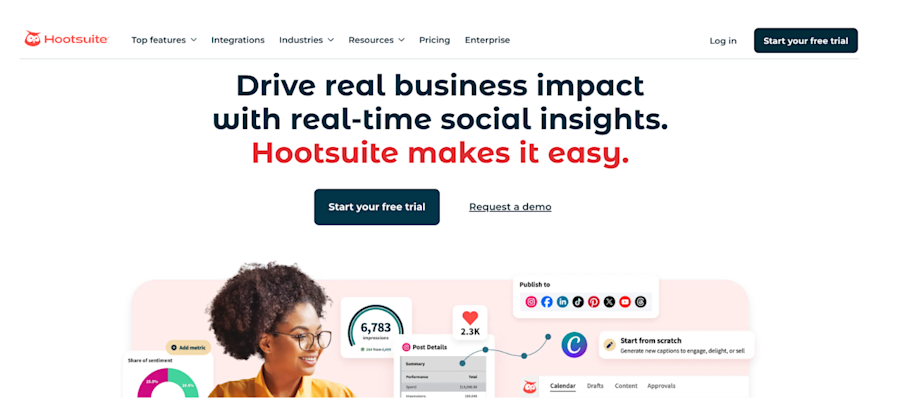
Hootsuite is one of the most comprehensive social media automation tools. It allows you to manage all of your social media accounts in one place.
With features that help you schedule content, curate from a preapproved library, and monitor conversations about your brand and industry, Hootsuite has everything you need to establish a social media presence that makes a difference for your brand.
Hootsuite's pricing varies between $99 and $249 per user per month depending on factors like social profiles and users. For enterprise pricing, contact Hootsuite.
14) Buffer
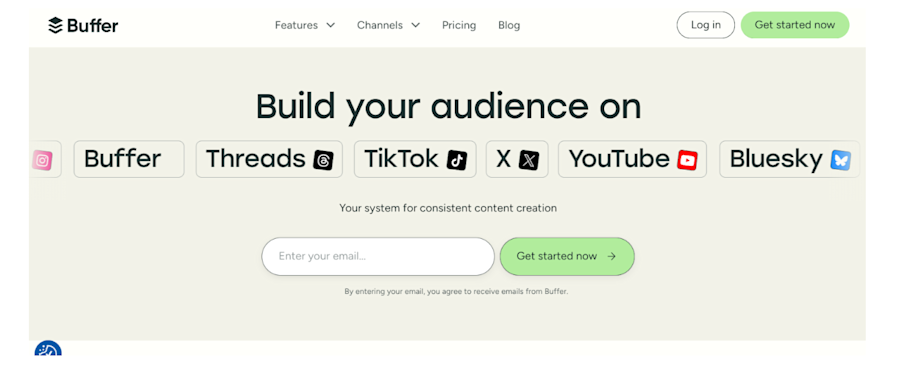
Originally a social media content scheduling tool, Buffer has grown to reflect how today’s brands use social media. Buffer is designed to simplify and streamline the process of scheduling, publishing, and analyzing content across various social media platforms.
It allows users to manage multiple social accounts, collaborate with team members, and analyze performance metrics to optimize their social media strategies.
Buffer offers a free forever plan that allows one user to connect up to three channels. Buffer’s Essentials plan costs $5 per month and includes one user account. The Team plan costs $10 per month and has unlimited user accounts.
15) CoSchedule
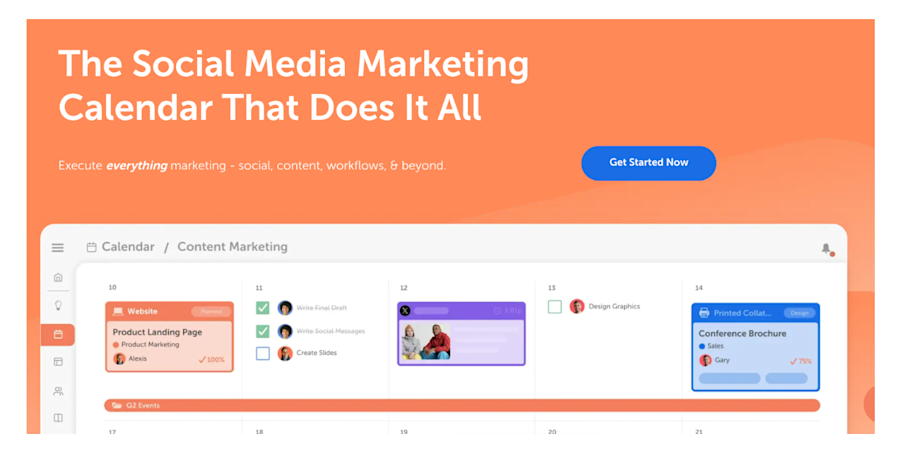
CoSchedule’s automation tool offers one of the best solutions for planning and strategizing social media content in advance.
By mapping out all of your content, including what you’ll say and when, it’s easy to get a bird’s-eye view of your end-to-end social production process.
Plus, CoSchedule’s analytics and suggestions clarify what resonates with your audience so that you can reuse popular posts and create more similar content.
These features streamline marketing workflows and ensure consistency across various channels, all within a single interface.
CoSchedule offers a free forever plan for individuals looking for basic social publishing. CoSchedule's pricing begins at $19 per month, varying with the number of social profiles, users, and included features.
16) Sprout Social
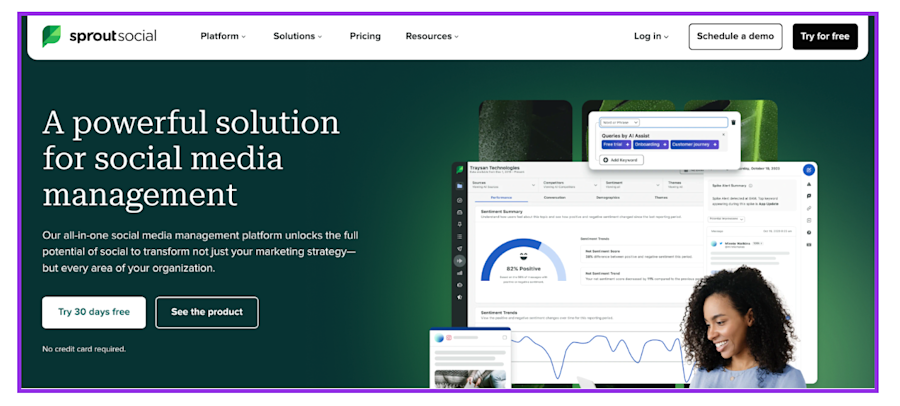
Sprout Social has one of the broadest feature sets among the social automation tools on our list—with individually tailored solutions for everything from social management and marketing to customer care, employee advocacy, and data and intelligence.
Sprout Social includes features that enable you to gather, analyze, and derive actionable insights from your social media data, helping you make informed decisions and optimize your strategies based on the collected intelligence.
The publishing wing of Sprout Social’s solution is also great for teams, making it easy to collaborate on strategies and execution.
Sprout Social's pricing varies between $199 per seat per month and $399 per seat per month, depending on the included features and the number of social profiles required. For Enterprise pricing, get in touch with Sprout Social.
17) Mention
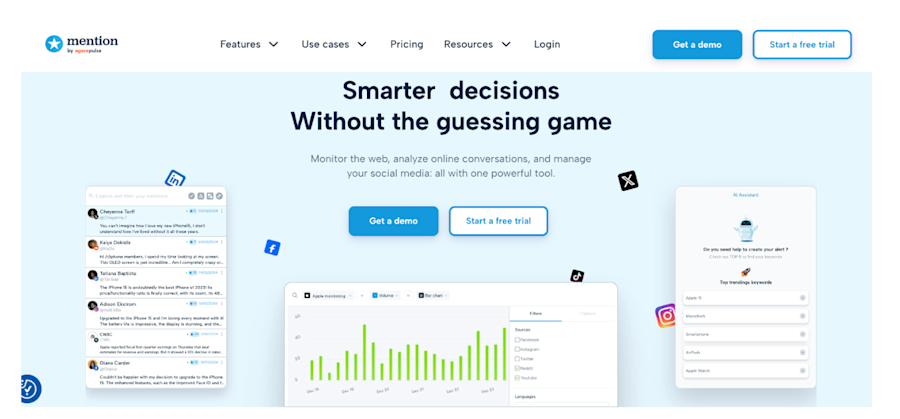
Leaning hard into the social listening aspect of social media marketing, Mention enables brands to track mentions across the digital media landscape.
You can keep track of how your campaigns spur conversations across the web—not just on social media. Plus, Mention also makes it easy to automatically track competitors and industry trends.
Mention's pricing starts at $41 and goes up to $149 monthly, depending on the scope of your social listening needs. For unlimited social accounts and advanced alerts, contact Mention for pricing.
Best customer journey automation tools
When we talk about customer journey automation from a marketing perspective, we’re talking about three main stages of the lead management process:
Lead generation
Lead scoring
Lead nurturing
The automated marketing platforms in this section are designed to make one or more of those steps work more efficiently without a human babysitter.
Customer journey automation tools are best suited for enterprise and B2B marketing and sales teams. They could help you scale your operation if:
You’ve already mapped out the journey a customer takes from new lead to sale.
Your marketing and sales teams work closely together to manage the customer journey.
You’re using an account-based sales or account-based marketing model.
18) Leadfeeder
Pricing: 14-day free trial; paid plans start at $99 per month
Rating: 4.3 stars out of 5 on G2 (based on 725 reviews)
Leadfeeder tells you which companies visit your website, even if they never fill out a form or contact you.
Leadfeeder also shows you contact information for employees at the company. This allows you to follow up with visitors who have yet to inquire about your product or time your outreach efforts for potential leads in your sales pipeline.
To try out Leadfeeder, all you need to do is install the Leadfeeder Tracker (It takes less than five minutes!).
A 14-day free trial is available, with paid plans starting at $99 per month. Note: Want to generate more leads from your website? Sign up and try Leadfeeder for free for 14 days to see all of the companies that visit your site, plus info on the pages they looked at, how much time they spent there, and more.
19) Act-On
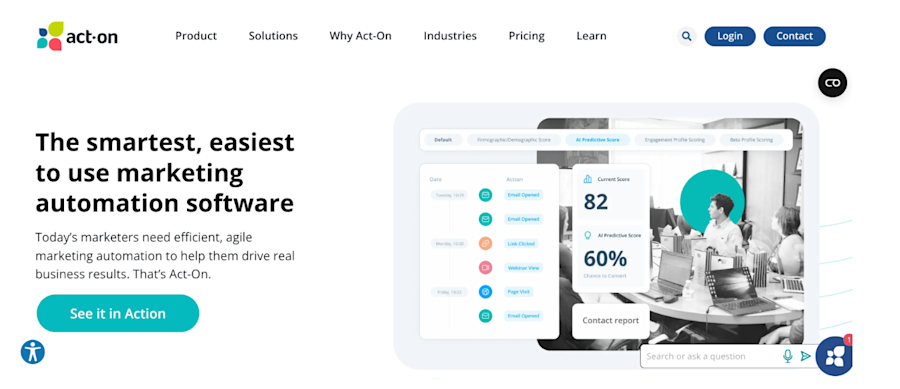
Act-On’s marketing automation software is designed for enterprise brands. It allows you to automate personalized and targeted customer interactions throughout the sales funnel with features such as email creation, lead scoring, automated workflows, CRM integration, and reporting.
The tool helps connect two essential things:
Your marketing and sales teams
The breadcrumbs that leads drop across the web
That means it’s easier to identify (and agree upon) the best leads to pursue—making Act-On an excellent option for large and B2B companies following an account-based marketing strategy.
Act-On’s pricing starts at $900 per month. For Enterprise Custom pricing, get in touch with Act-On.
20) LeadSquared
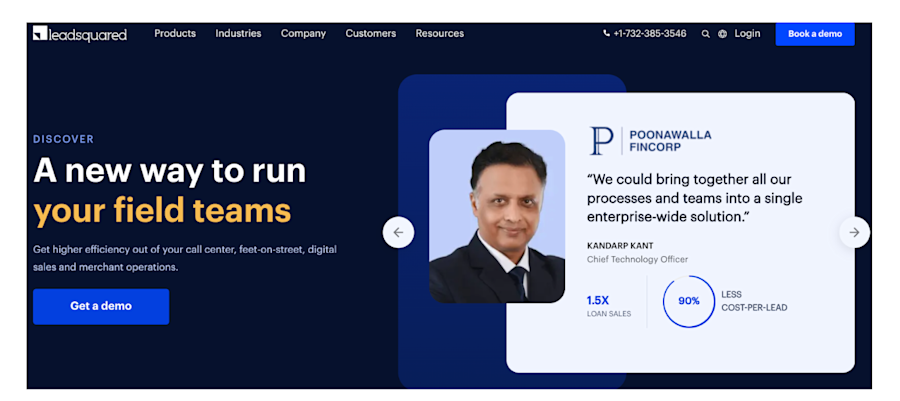
LeadSquared is a customer journey automation tool that’s primarily focused on the lead nurturing phase of the process. The tool is designed to help move leads through the funnel faster so you can land more new customers in less time.
It's tailored to manage and streamline your lead capture efforts, lead engagement, sales pipeline, and customer data. You can set triggers, conditions, and actions to automate your drip marketing—so you never miss an opportunity to advance leads toward a purchase.
LeadSquared’s marketing automation pricing ranges from $1,200 per account for the Marketing Pro plan and goes up to $2,000 per account for the Marketing Super plan.
21) Keap
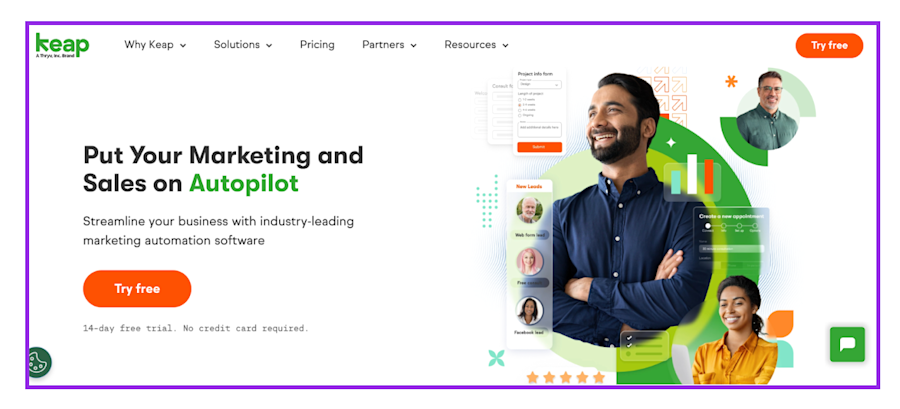
Keap, formerly known as Infusionsoft, is a robust CRM and marketing automation platform that’s primarily designed for small businesses and entrepreneurs.
It offers a suite of tools that help manage customer relationships, sales processes, and marketing campaigns in an integrated manner.
The platform aims to help businesses organize their contacts, automate repetitive tasks, nurture leads, and streamline their sales processes.
Keap has made it easy to optimize email campaigns, workflows, landing pages, and more from prebuilt templates.
When paid annually, Keap's pricing structure begins at $249 per month for two users and 1500 contacts. The cost increases as the number of users or contacts increases.
Best pricing automation tools
If you want to stay competitive amid changes to your competitors' pricing structure or refine your own pricing strategy, pricing automation software can simplify your adjustments, turning your pricing approach into an advantage.
Pricing automation tools are typically tailored for e-commerce scenarios. If you sell products in a competitive, price-sensitive market, employing a pricing automation tool can be a valuable choice for your business.
22) Prisync
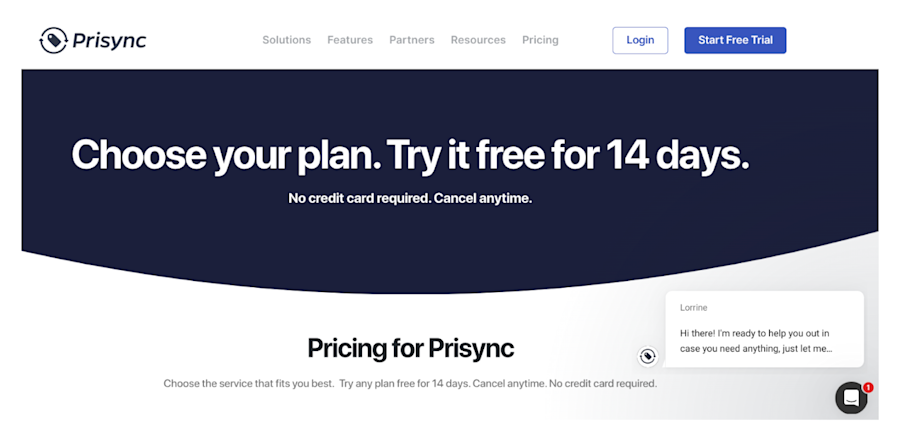
Prisync’s pricing automation software is designed for e-commerce. It’s a competitive pricing intelligence platform that’s designed to monitor and analyze your competitors' pricing strategies.
With Prisync, you can track and compare prices across different e-commerce platforms, gaining valuable insights into market trends, pricing fluctuations, and competitor activities.
Since the e-commerce industry tends to harbor some of the most price-conscious consumers, it’s vital that brands can react to competitive pricing changes in a hurry.
Prisync automates that process so that you’re always on top of competitors’ pricing strategies and how they compare to yours.
This tool can help you optimize your pricing strategy, make informed decisions, and stay competitive in your market. It costs between $99 and $399 per month, based on the features and the number of products.
23) Wiser
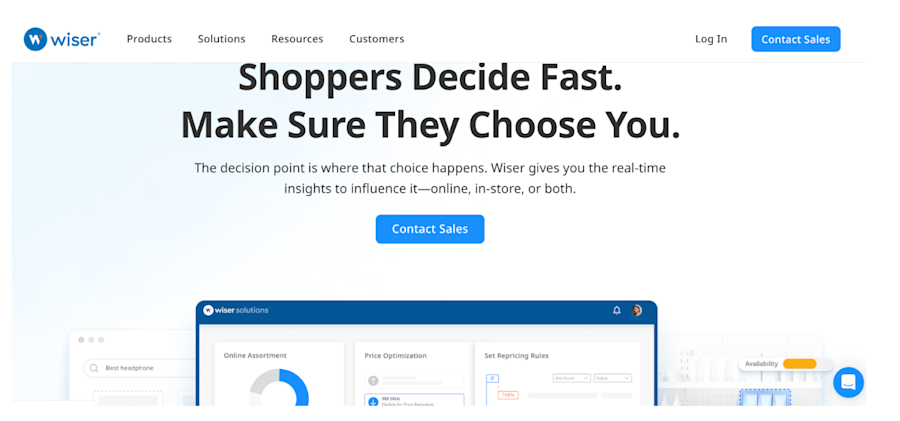
Wiser is an advanced retail analytics and pricing intelligence platform. It gathers valuable data on competitor pricing, product assortment, and overall market trends.
The tool can help with everything from A/B testing your prices to estimating demand and finding the sweet spot to maximize your bottom line.
As demand and other market forces change, Wiser does the heavy lifting so your pricing strategy always works—for you and your customers. Contact Wiser for pricing information.
24) Informed Repricer
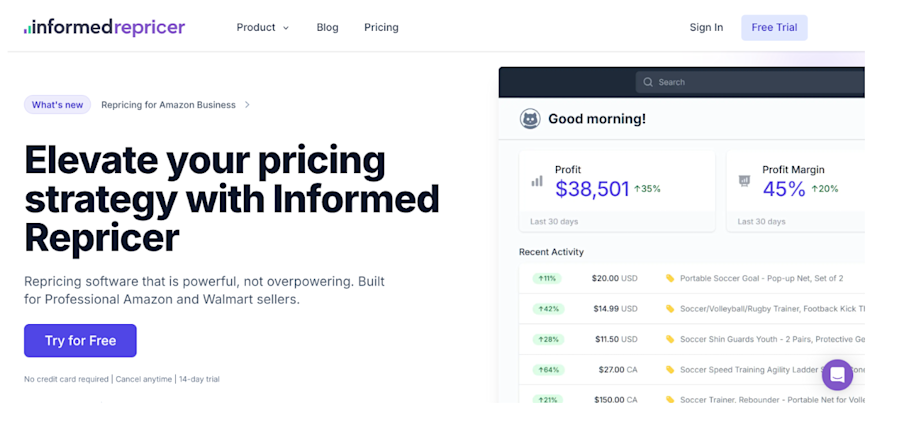
Informed Repricer, formerly known as Reformed, is a repricing automation tool for e-commerce businesses and online sellers.
With support for 21 Amazon marketplaces and the Walmart marketplace, the tool works in many places that you can sell online.
Informed’s approach to repricing is unique because the solution allows you to choose between establishing your own pricing strategy from scratch or following the lead of its AI-powered suggestions.
Pricing ranges from $99 to $249 per month, based on marketplaces, repricing strategies, support, and more.
25) Skuuudle
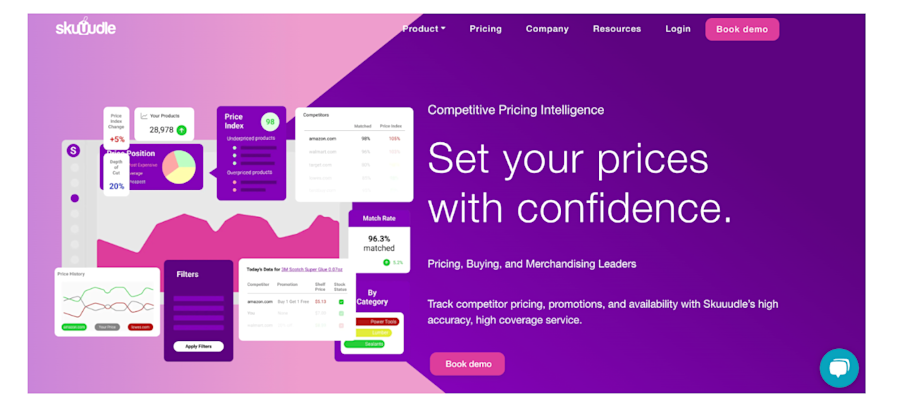
Skuuudle is a competitive intelligence platform that’s designed to empower businesses in the e-commerce sector. It provides comprehensive data and insights on product pricing, assortment, and market trends.
Designed for brands with an extensive catalog of products, Skuuudle makes it effortless to monitor competitor pricing and match products at scale so you never miss a sale because of the price.
Skuuudle is one of the few pricing automation tools that pull customer data from e-commerce marketplaces and direct sellers. It monitors your competitors' pricing strategies, tracks product availability, and analyzes market dynamics.
By leveraging Skuuudle's data-driven insights, companies can make informed decisions, optimize their pricing strategies, and stay competitive in the rapidly evolving e-commerce landscape.
Contact Skuuudle for pricing information.
Best advertising automation tools list
With everything that goes into creating and optimizing digital ads these days, most marketers need a helping hand. From building creative ads across channels to optimizing bidding strategies, using advertising automation tools is one of the best ways to scale digital ad campaigns.
Similar to the all-in-one tools, you don’t need advertising automation until:
You’ve gained traction on more than one advertising platform (e.g., Facebook and Twitter or Google Ads and Instagram).
You’re looking to refine your creative material and bidding strategies instead of heavily testing them from scratch.
You want to advertise to hyper-targeted segments, like remarketed audiences.
26) AdRoll
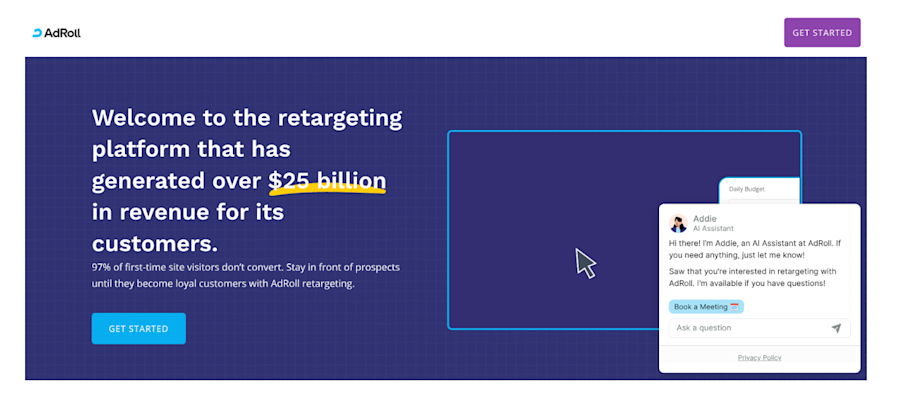
AdRoll is probably one of the best-known digital advertising automation tools, and for good reason.
You can use it to retarget potential customers who've checked out your website before. It helps by tracking what users do on your site and then showing them tailored ads on the different online platforms they visit later.
With AdRoll, you can create personalized campaigns to reconnect with these visitors across websites and social media platforms. It's a handy tool that lets you fine-tune your ads based on user behavior, aiming to boost conversions and engagement with your audience.
AdRoll’s pricing starts at $36 per month.
27) Metadata.io
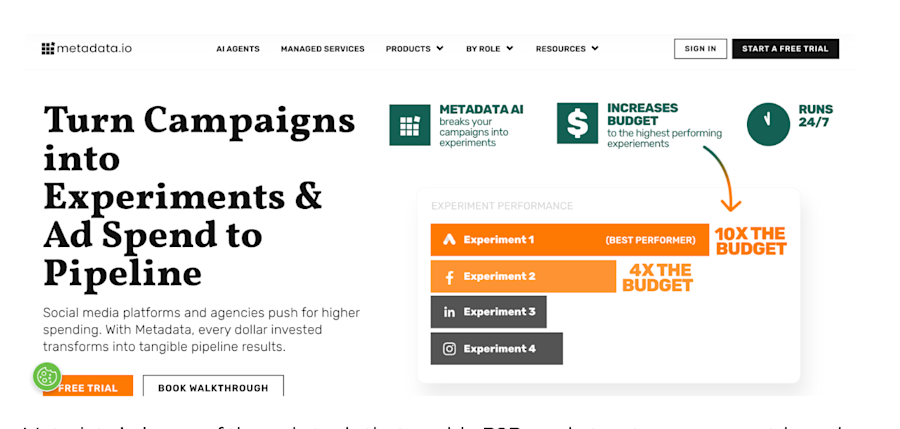
Metadata.io is one of the only tools that enable B2B marketers to run account-based ads. With Metadata.io, you can automate and optimize your demand generation efforts as a marketer.
The platform uses AI and machine learning to make creating, running, and fine-tuning digital ad campaigns easier across different channels.
It's all about simplifying the complex tasks involved in managing campaigns. Metadata.io offers tools that help you target specific audience segments, generate leads, and improve the overall performance of your campaigns.
By constantly analyzing data and campaign results, this platform helps you fine-tune your marketing strategies to maximize your ROI and efficiently achieve your objectives.
For Metadata.io’s pricing, get in touch with Metadata.io.
Pro tip: You can use Metadata.io and Leadfeeder to run account-based retargeting campaigns.
28) Zalster
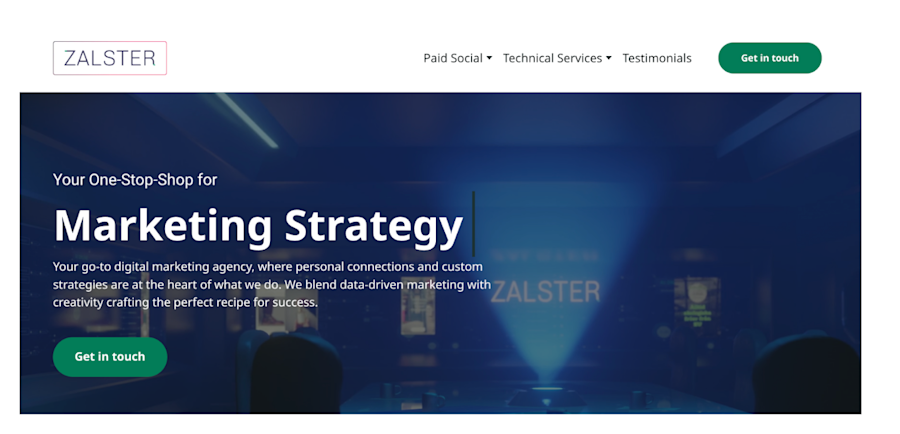
Zalster is an advertising automation tool that handles Facebook and Instagram ads. This platform is all about simplifying the way you manage your ad campaigns. It offers tools and features that help you create, optimize, and analyze your ads more efficiently.
Zalster uses automation and algorithms to boost your ad performance, target your audience better, and allocate your budget more effectively.
Through its dashboard, you can monitor campaign metrics, make data-driven decisions, and fine-tune your ad strategy for improved outcomes.
Contact Zalster for pricing information.
29) Bïrch
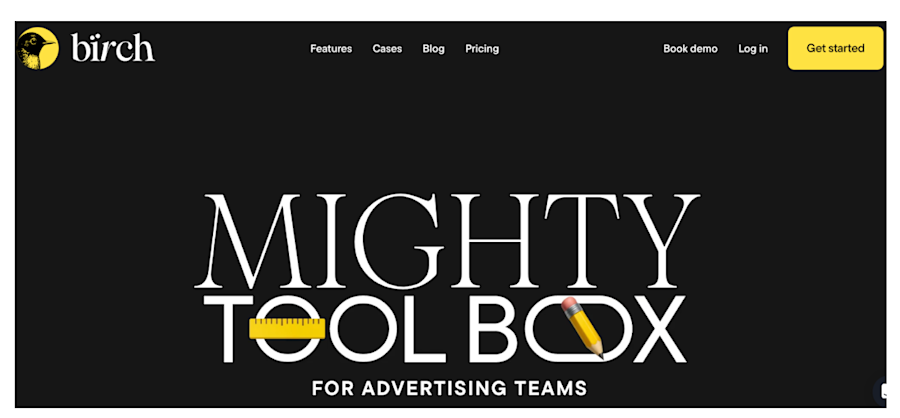
With Bïrch, formerly known as Revealbot, you can automate and optimize your ad campaigns across social media platforms like Facebook, Instagram, Snapchat, and Google Ads.
This platform simplifies your advertising efforts by providing tools to help you create, manage, and analyze your campaigns more effectively.
AI-driven optimization allows you to set up campaign-specific rules that drive better results. These rules trigger automatic adjustments based on the metrics you choose, helping you optimize your ad spend, target your audience better, and ultimately improve your performance and ROI.
Bïrch’s pricing starts at $45 per month for the Essential plan
30) Trapica
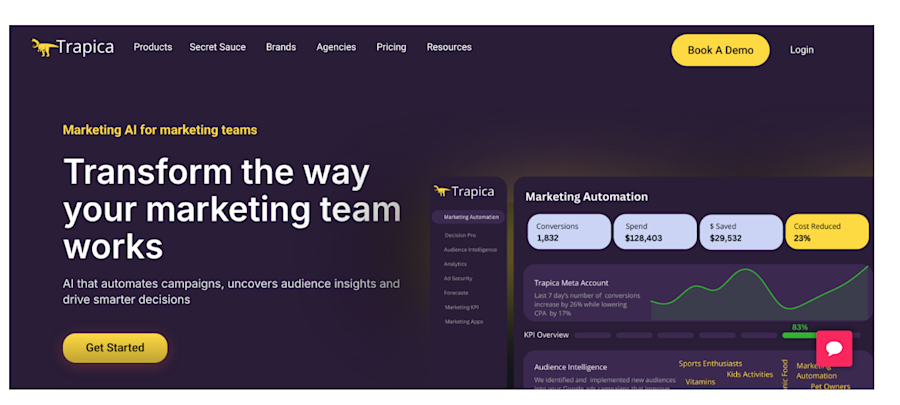
Trapica is another one of the AI marketing automation tools in our list that uses artificial intelligence to optimize your digital ad campaigns across platforms such as Facebook, Instagram, and Google Ads.
This tool uses machine learning algorithms to analyze your real-time campaign performance data.
Based on this analysis, it automatically adjusts your targeting parameters, creative material, and bidding strategies. Trapica aims to maximize your performance by continuously learning from user interactions.
The algorithms offer a deeper look into who your audience is, and the robust targeting features help you reach that audience at just the right time to spur a purchase.
Contact Trapica for pricing information.
31) Shoelace
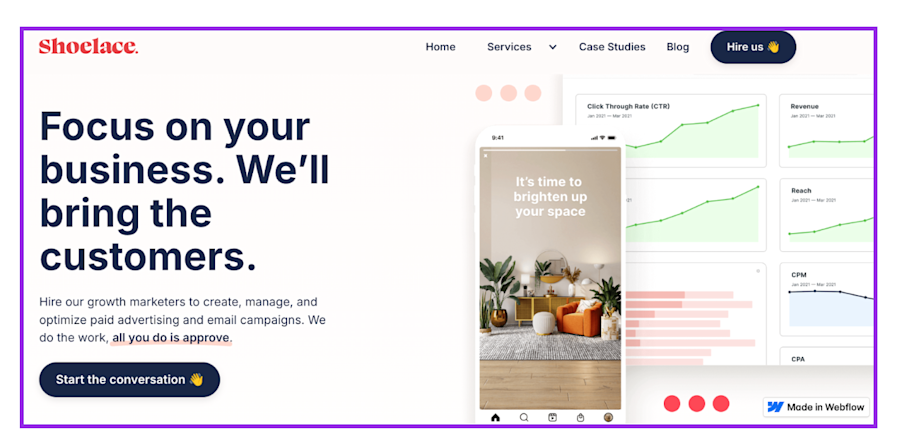
Shoelace focuses on what it calls "customer journey retargeting." Shoelace guides your customers through their purchasing journey by crafting personalized ad sequences based on their interactions with your brand.
It automates the creation of these sequences, aiming to re-engage customers at different stages of the sales funnel.
The software offers segmentation that enables hyper-targeted ads and sequences that prevent ad fatigue.
Shoelace has four pricing plans, ranging from $249 per month to $2,000 per month.
Best loyalty and referral marketing automation tools
Loyalty and referral marketing is often included in the conversation around marketing automation, but it needs to capitalize on the most powerful marketing tool of them all — word of mouth.
An automated loyalty or referral program could be a good fit for your business if:
You’ve already seen tangible results from word of mouth.
Your products don’t require extensive research or negotiations to arrive at a buying decision.
Your industry’s average customer lifetime value is high enough that the up-front investment makes sense.
If so, these tools will help you spur and take advantage of buzz, taking your referral and loyalty programs to new heights.
32) Referral Rock
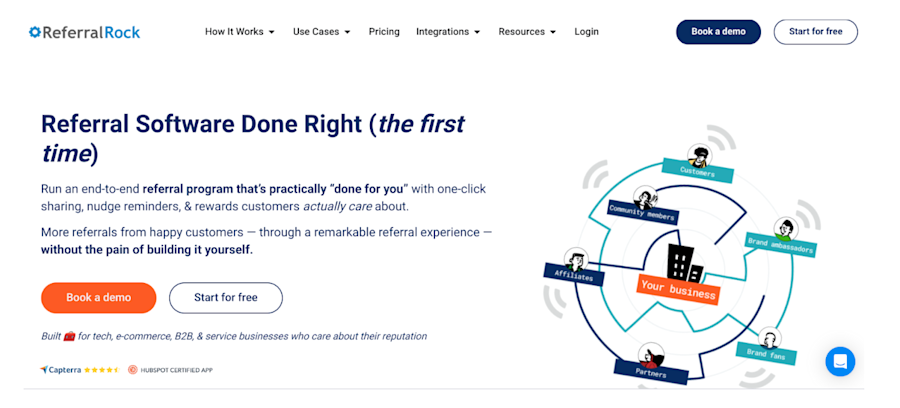
Referrals are powerful, but you must be proactive about encouraging and capitalizing on them.
Referral Rock makes it easy to set up the correct type of referral program for your business—from refer-a-friend to influencer marketing to business partner programs—so you can set it up once and let the referrals roll in on autopilot.
You can customize your referral programs, track referrals and rewards, integrate additional tools, and analyze how well your program is doing.
Referral Rock’s monthly pricing ranges from $175 to $350, based on the number of members, programs, and more.
33) TapMango
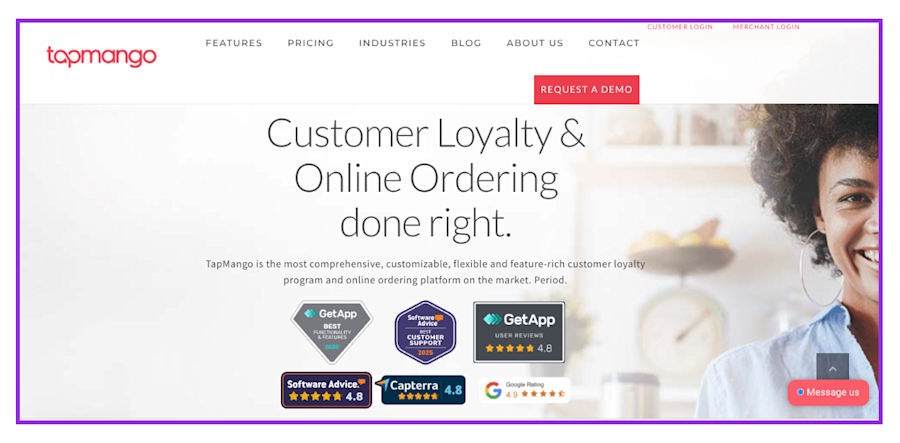
TapMango’s customer loyalty automation platform takes the punch card of the old days and modernizes it for today’s customers.
It provides tools to set up loyalty strategies, such as points, rewards, and personalized offers to keep your customers engaged and returning for more.
With TapMango, you can track customer behavior and program performance through analytics, empowering you to make informed decisions to improve your customer retention efforts.
Contact TapMango for pricing information.
34) Ambassador
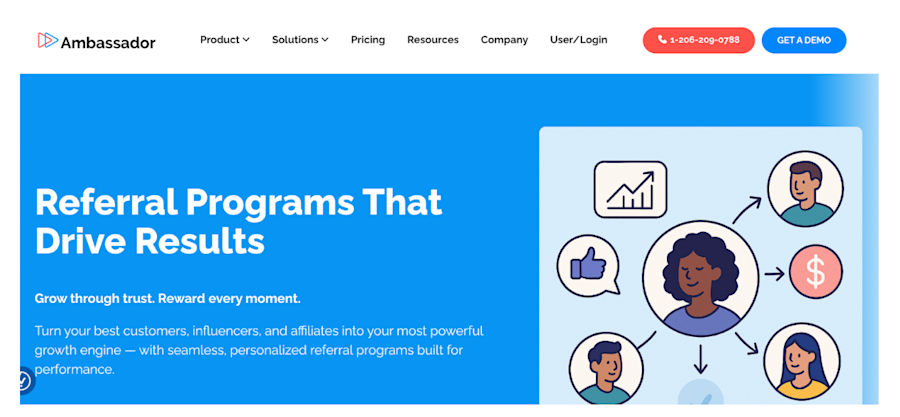
Ambassador makes it easy to build a powerful army of brand ambassadors. From hand-selecting the customers you want to mobilize to automating and testing incentives to find the right mix of rewards, Ambassador puts brand advocacy on autopilot for you.
Its tools help companies design and manage their referral campaigns, allowing them to leverage their existing customer base to acquire new customers.
The platform provides many integrations and prebuilt templates so marketers can get their programs off the ground quickly.
Pricing starts at $300 per month for the Growth Plan. For the Pro Plan, prices start at $500 per month. For the Enterprise plan, contact Ambassador for a custom quote.
35) Clutch
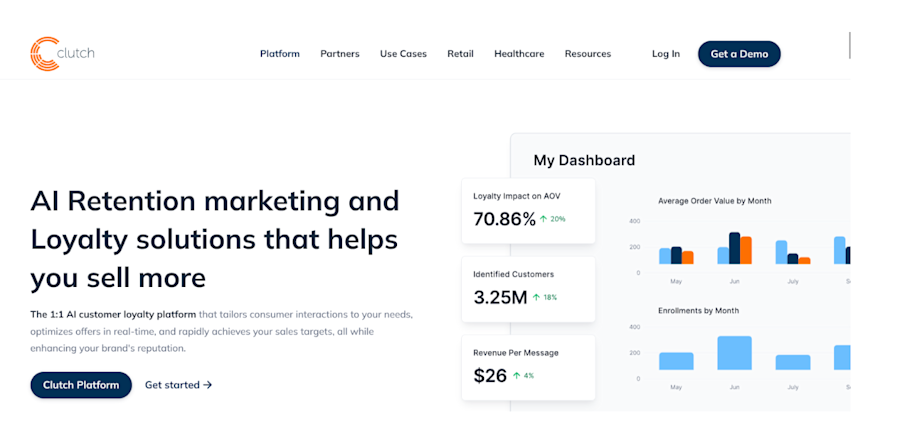
Clutch’s unique approach to loyalty marketing emphasizes building a deeper understanding of what drives loyalty for your unique customers.
The integrated platform makes it easy to attribute sales from any channel, and the flexible rewards help you appeal to every type of customer and their motives.
Clutch’s Basic plan is $3,000 per feature per month.
36) Referral Factory
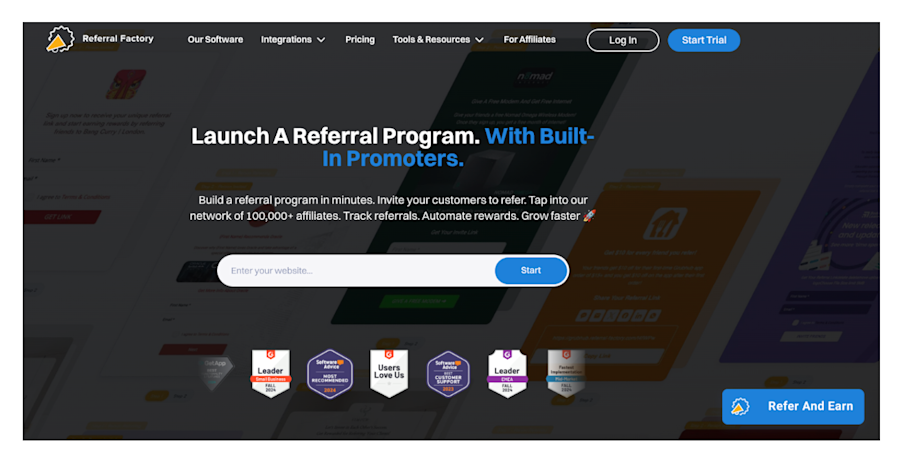
Referral Factory is a no-code platform that assists businesses like yours in creating and managing referral programs. Its features help you design customizable referral campaigns to leverage your existing customer base to attract new customers.
With Referral Factory, you can set up various types of referral programs, track referrals, manage rewards, and analyze the performance of your referral initiatives.
Referral Factory has four pricing plans that range from $76 to $800 per month when paid annually.
37) Brevo
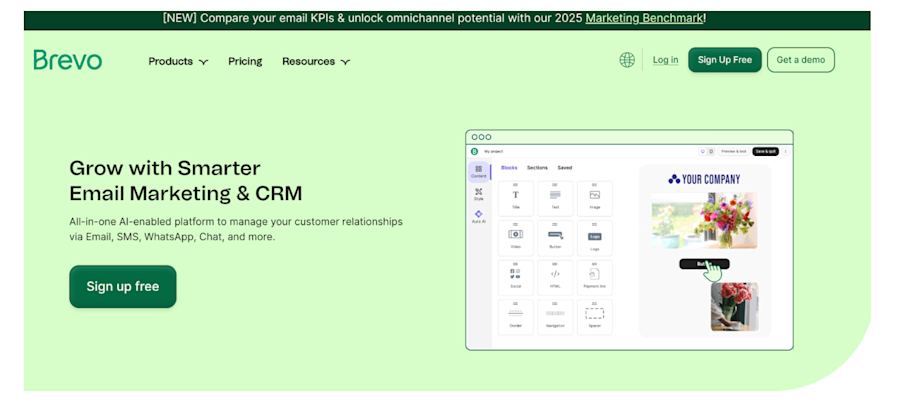
Brevo, formerly Sendinblue, is an all-in-one marketing and CRM platform that’s designed to assist businesses like yours in managing their marketing and communication efforts. It offers tools for email marketing, SMS campaigns, marketing automation, and more.
With Brevo, you can create and send personalized emails and SMS messages, set up marketing automation workflows, manage contact lists, and analyze campaign performance through reporting and analytics.
Brevo has a free plan, but the cost of paid plans varies from $8.08 per month to $16.17 per month based on your chosen features. For Enterprise pricing, contact Brevo.
What are the best marketing automation tools for start-ups?
The best marketing automation tools for small businesses and start-ups offer a balance between features, ease of use, and affordability. They deliver core functionality without the enterprise-level complexity and price tag.
For instance, Omnisend is an excellent choice if you’re just beginning your marketing automation journey. It’s an intuitive platform with automation workflows that won’t overwhelm you. Its free tier allows you to send up to 500 emails monthly, making it ideal for early-stage start-ups watching their budget.
ActiveCampaign is good if you need more robust capabilities but still want affordability. It strikes an excellent balance between powerful automation features and usability, with pricing that scales reasonably as your contact list grows.
For start-ups looking to step up their lead generation game, Leadfeeder is perfect. It’s great for tracking website visitors and turning them into qualified leads.
Drip stands out if you're looking for an e-commerce-focused automation platform that combines powerful email marketing with revenue tracking and customer segmentation capabilities.
Hootsuite is ideal for start-ups needing to automate their social media management. It offers a user-friendly interface and comprehensive scheduling features at a reasonable price point.
When evaluating small business marketing automation tools, prioritize solutions that offer straightforward onboarding, responsive customer support, and educational resources.
Choose the best marketing automation tool for your business
Consider the following factors before investing in a marketing automation tool for your business:
Type of business: Look for automation solutions that provide your business with the tools necessary for success. Certain marketing automation platforms tailor their services to specific industries or business models.
Ease of use: The marketing automation tool you choose should have little to no learning curve. This way, your team can quickly master and start implementing it.
Integrations: Invest in a solution that integrates seamlessly with your existing tools and technology stack to ensure smooth data flow and workflow.
Customer support and resources: Ensure the marketing automation tool you settle on has a reliable pre-sales and post-sales support system. You also want a solution that has comprehensive documentation and readily available training resources to help maximize your investment.
Pricing: Review your budget and consult the relevant stakeholders to understand your budget constraints and expected return on investment. This allows you to select a tool that delivers value without breaking the bank.
Scale your marketing efforts with the best marketing automation tools
Marketing automation is a rapidly developing field. Despite this progress, there are still differing opinions on which digital marketing automation tools are best suited for specific businesses—especially since many organizations need a combination of tools to address all their marketing needs effectively.
As a result, not every company or marketing team is ready to adopt automation right away. But when the time is right, using the right tools can elevate a strong marketing strategy to new heights.
By clearly understanding your unique goals and choosing the digital marketing automation tools that align with them, you can turn valuable insights into impactful actions at scale. This shift allows you to spend less time managing complex details and more time focusing on driving business growth.
Marketing automation tools FAQs
How can I use marketing automation tools effectively?
To use marketing automation tools effectively, start by clearly defining your goals and creating a documented strategy. Focus on understanding your audience, setting up proper tracking, and gradually implementing automation workflows that align with your customer journey.
Remember to regularly analyze results and refine your approach based on data-driven insights
What’s the biggest obstacle to successful marketing automation?
Marketing automation typically fails due to poor data quality, lack of clear strategy, and insufficient team training to maximize the tool's potential.
How much does a marketing automation tool cost?
The cost of marketing automation tools varies greatly. Certain tools cost less than $10 per month, and others cost thousands of dollars per month, depending on the features and scale.
For example, Brevo starts at $8.08/month, while Marketing Cloud Account Engagement can be over $1,250/month. HubSpot offers plans starting at $20 per month per seat.
Are free marketing automation tools good?
While free marketing automation tools can be a good starting point, they often come with limitations. However, they can still provide significant value for businesses that are just beginning their automation journey.
The main advantages of free marketing automation tools include:
Zero initial investment risk
Opportunity to test automation
Disadvantages include:
Limited features and capabilities
Restricted number of contacts or actions
Basic reporting functionality
Limited integration options
Brand watermarks on communications
Now that you're here
Leadfeeder is a tool that shows you companies that visit your website. Leadfeeder generates new leads, offers insight on your customers and can help you increase your marketing ROI.
If you liked this blog post, you'll probably love Leadfeeder, too.
Sign up







